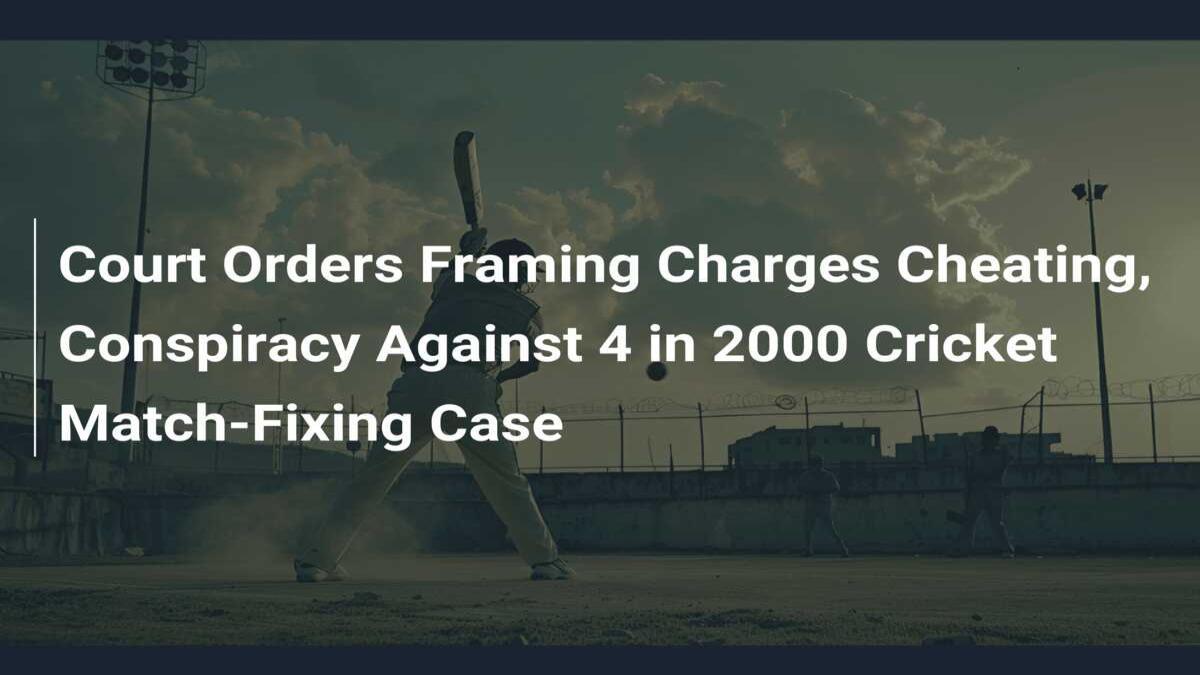New Delhi, Jul 13 (PTI) A court here has ordered framing charges of criminal conspiracy and cheating against four persons accused of fixing international cricket matches between India and South Africa in 2000.
Additional Chief Judicial Magistrate Neha Priya was hearing the case against Rajesh Kalra, Krishan Kumar, Sunil Dara and Sanjeev Chawla. The Chanakaya Puri police station had registered a case against them.
Noting the evidence before it, the court said that the “chain of events, record of conversations, conduct and surrounding circumstances” showed the complicity of Kalra, Kumar and Dara in the deals struck by Chawla with Hansie Cronje (deceased and also an accused) and led to the “inference that they were acting in connivance and were co-participants in the main object of fixing cricket matches for monetary gain.” In an order passed on July 11, the court said there was sufficient material on record to frame charges against the four accused under Indian Penal Code sections 420 (cheating) read with 120 B (criminal conspiracy) and for the offence under section 120 B of the IPC.
The material raised “grave suspicion against each of them regarding their role in the criminal conspiracy to cheat and dishonestly induce delivery of property from the spectators and BCCI during the test matches and one day international (ODI) cricket matches held in India from February 19 to March 19, 2000, between South Africa and India”.
“Charges are ordered to be framed accordingly,” the court said.
In its 68-page order, the court said the call details and recordings disclosed that the accused persons were in constant touch with each other discussing various facets of match-fixing and betting.
“The transcripts of their call intercepts reveal that during this time, they discussed the team composition for the next upcoming match in a series of matches between South Africa and India (based on the information received by accused Sanjeev Chawla from accused Hansie Cronje); the fixed team scores/ individual scores agreed with accused Hansie Cronje; amount of money to be placed on bets; pooling of money; their odds if the players don’t perform as per agreed plan; money transactions during betting/match fixing, etc.” the court said.
It observed that the maxim that truth is stranger than fiction was more true in the case of cricket than any other sport and the only thing predictable about a game of cricket was its unpredictability.
“In fact, one of the reasons for such astounding popularity of cricket is the element of uncertainty and the lack of predictability of results, even by the experts. If this aspect of the game is taken out of the equation, and if the spectators know that the result is pre-decided, there would be zero interest in watching the match,” the court said.
“For personal monetary gain, accused no. 6 Hansie Cronje (in connivance with the accused persons) is alleged to have fixed the matches, altered the natural course of the game and still participated in the matches as a captain of the rival team concealing the same,” it added.
Regarding the argument of the counsel for the accused that match-fixing was not an offence in the country, the court said, “If the alleged acts of match-fixing satisfy the ingredients of the offence under section 420 of the IPC, such acts cannot escape the clutches of the said law only for want of a special law.” “In other words, the question before the court is not whether match-fixing is an offence in India, but whether in the present factual matrix, the allegations (of match-fixing) in the charge-sheet amount to an offence under section 420 IPC?” it added.
The court also said that according to the material on record, it was apparent that Cronje and Chawla were “pre-deciding individual and team scores of upcoming cricket matches” and Cronje was “providing sensitive information about pitch and team composition”.
It said that Cronje was “actively involving team members and was getting them to perform as per the pre-decided scores (as agreed with accused Sanjeev Chawla) by offering them money” and he was also deciding the payment to be made by Chawla to him and the other players for “manipulating the outcome of the cricket matches by agreeing to underplay and getting his teammates to underplay.” Chawla further shared this information with other accused persons who were betting on cricket matches accordingly, the court said.
“As agreed between accused no. 4 (Chawla) and 6 (Cronje) South Africa did not score more than 250 runs in each innings of the first Test match, and lost the first ODI match at Cochin,” it added.
The matter has been posted on July 31 for further proceedings.
Source: PTI News














